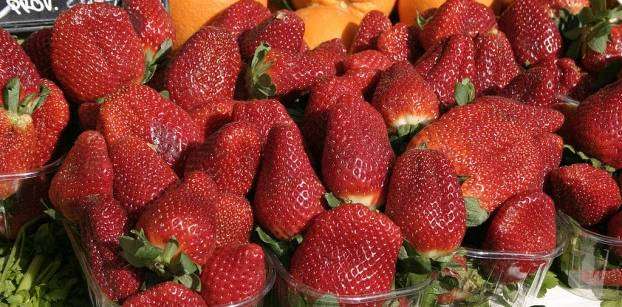Did Egyptian strawberries cause hepatitis A in U.S. state of Virginia?

Strawberries' photo taken from Wikipedia
CAIRO, Aug 23 (Aswat Masriya) - While Virginia Department of Health is investigating the reason behind a number of hepatitis A cases, which it believes to be related to strawberries sourced from Egypt, medical and agricultural professors express skepticism over the possibility of the disease’s transmission after having gone through long freezing processes.
In a statement on Friday, the VDH said that it identified a "potential association" with smoothies from Tropical Smoothie Cafe restaurants in Virginia.
Hepatitis A is a liver disease, primarily transmitted through the ingestion of contaminated food and water.
The VDH conducted genetic testing which showed that "the illnesses were caused by a strain of hepatitis A that has been associated with past outbreaks due to frozen strawberries from Egypt."
In response, Tropical Smoothie Cafes defended their cafes and food practices, saying that they "have not been implicated in anyway."
The chain said in a statement dated Aug. 19 that after having been notified from the VDH, about "several food borne illnesses" linked with strawberries sourced from Egypt, Tropical Smoothie Cafe withdrew all the strawberries sourced from Egypt from all the cafes within its system.
But Alaa Awad, professor of hepatic diseases at Theodor Bilharz Research Institute, said it is "very difficult" for frozen strawberries to cause hepatitis A, pointing to the unlikeliness for the virus causing the disease to remain active under a state of freeze.
Professor of food industries and former dean of home economics at Helwan University Abdelrahman Attia said that exported strawberries must meet a number of requirements relating to maturity and size as well as being non-carriers of any microbes or viruses.
He said that strawberries have to be subjected to the freezing process, at 0 degrees, which renders the virus inactive in case the product is carrying it.
He added that exported agricultural products undergo very careful examination, pointing that in some cases the sizes of the fruits is measured.
Awad said the incubation period for a virus is between one-three months which means that if someone ate food contaminated with the virus, the symptoms will take more than a few days to appear on the patient.
The Virginia health department however said that frozen strawberries smoothie consumers from a Tropical Smoothie Cafe in Virginia between Aug 5-8 , "may still benefit from vaccine or immune globulin to prevent hepatitis A."
It also urged frozen strawberries' consumers in the last 50 days to watch for symptoms of hepatitis A.
The U.S granted Egypt market access to export strawberries in February 2013.
The then-U.S. ambassador to Egypt Anne Patterson said that Egypt is the fourth largest strawberry producer in the world, with production valued at nearly US $330 million annually.
Egypt’s strawberry exports to the European Union and Gulf countries reached $59 million in 2013.









facebook comments